The 10 Coolest Software-Defined Networking Tools Of 2020
With a healthy growth outlook predicted for the SDN market for the next seven years, here are 10 of the coolest software-defined networking tools of 2020.

Software-Defined Everything
The global software-defined networking market has been growing by leaps and bounds for the past decade. Despite a slowdown in overall IT spending during the COVID-19 pandemic, the market is expected to bounce back, and quickly.
Specifically, the global SDN market is expected to increase from $13.73 million in 2020 to $32.73 million by 2025, at a compound annual growth rate of 19 percent during the forecast period, according to ResearchAndMarkets.com. The research firm highlighted big-name vendors and channel-friendly players as the companies leading the way in SDN, including Cisco Systems, Extreme Networks and Hewlett Packard Enterprise. With such a healthy growth forecast, however, there’s plenty of room for new entrants and products on the market alongside the incumbents to help enterprises reach their IT goals and address their challenges, especially as the IT landscape continues to be shaped by the pandemic.
Here are 10 of the coolest software-defined networking tools of 2020.
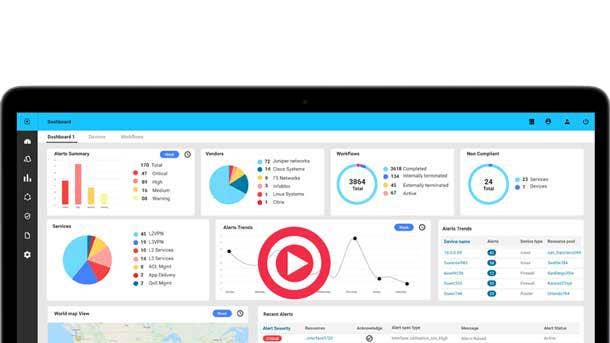
Anuta Networks’ ATOM
Anuta Networks got its start 10 years ago. The company has worked its way up the ranks and carved out a space for itself as a leader in SDN orchestration alongside Juniper Networks, HPE and Huawei. Anuta today develops and provides multivendor network service orchestration offerings for both enterprise customers and large-scale service providers through its ATOM platform, which helps customers automate and accelerate their network services.
The Milpitas, Calif.-based provider in June unveiled a partnership with Juniper. Anuta’s ATOM platform has been integrated into Juniper’s existing network automation portfolio, including Junos Telemetry, Juniper HealthBot and Juniper NorthStar products.
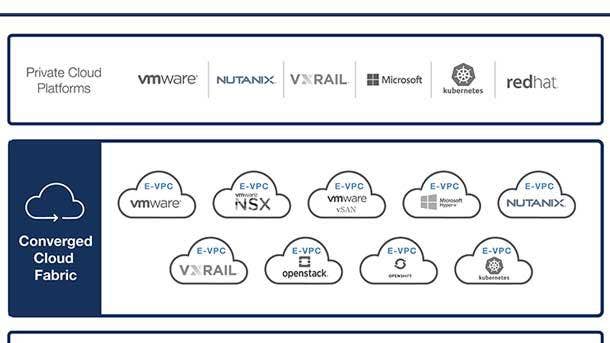
Arista Networks’ Converged Cloud Fabric
Thanks to its Big Switch Networks purchase in February, data center and large campus networking specialist Arista inherited more SDN chops in the form of Big Switch’s Big Cloud Fabric, its next-generation data center switching fabric that offers network automation and visibility for software-defined data centers and cloud-native applications.
Santa Clara, Calif.-based Arista has since renamed Big Cloud Fabric as Converged Cloud Fabric, its automated fabric built with cloud networking design principles, according to the company.
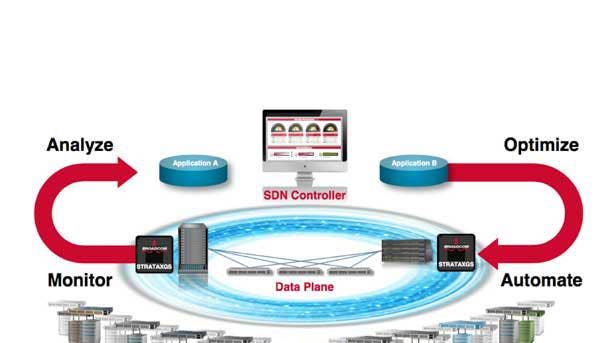
Broadcom BroadView
Semiconductor specialist Broadcom has become a leader in the SDN arena with its growing portfolio of offerings and partnerships with fellow IT giants such as Dell Technologies, HPE and Juniper Networks.
Broadcom BroadView offers programmable access to the internals of a switch and provides offerings for dataplane tasks, including monitoring, congestion control and advanced troubleshooting using real-time telemetry. BroadView software is available in a full source code package distributed under Broadcom SLA, or via a Community Development Package (CDP), which is an Open API library with an Application Development Kit distributed on GitHub, according to the San Jose, Calif.-based company.
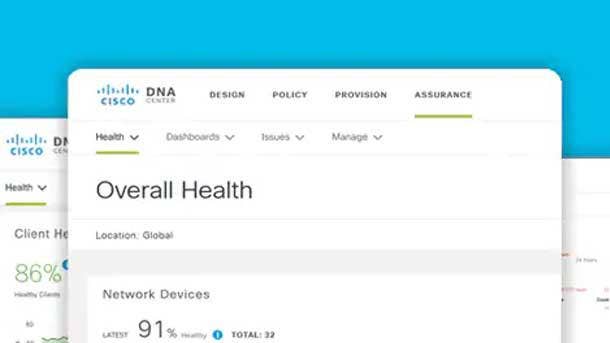
Cisco DNA Center
Cisco DNA Center is the tech giant’s network management platform for Cisco Digital Network Architecture, an intent-based networking approach built on SDN for the enterprise.
With Cisco DNA Center, businesses and channel partners can provision and configure all network devices in minutes. DNA Center uses advanced artificial intelligence and machine learning to monitor, troubleshoot and optimize networks, according to San Jose, Calif.-based Cisco. In June, Cisco DNA Center was bolstered with a couple of new software features, including AI Endpoint Analytics to let DNA Center identify previously unknown endpoints at scale. Drawing from various contextual sources and AI, these endpoints can then be segmented, grouped appropriately and have all policies applied, Cisco said.
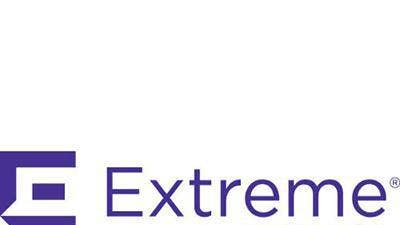
Extreme Networks SDN Platform
Extreme Networks comes to market with its SDN platform that promotes community-led innovation—enabling customers to migrate their existing networks to SDN without expensive forklift upgrades.
The Extreme Networks’ SDN platform is based on an OpenDaylight controller that offers network management, network access control, application analytics and wireless controller technology. San Jose, Calif.-based Extreme Networks first debuted its OpenDaylight SDN Controller in 2014.
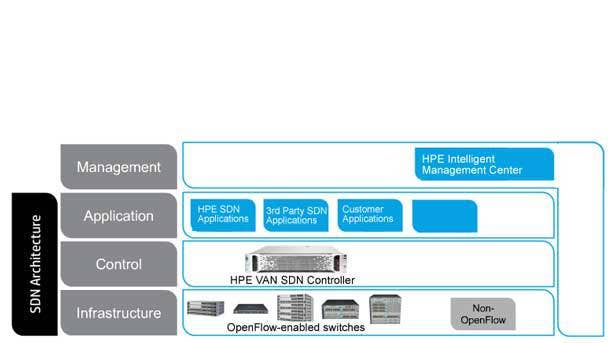
HPE VAN SDN Controller
Hewlett Packard Enterprise, one of the leaders in the SDN market, comes to the market with its Virtual Application Networks (VAN) SDN Controller. The VAN SDN Controller gives enterprises one control point for their SDN-enabled networks, which simplifies management, provisioning and orchestration.
San Jose, Calif.-based HPE said the platform is helping to power a generation of application-based network services with APIs that let developers create new offerings. The VAN SDN Controller is designed to operate in campus, data center or service provider environments.
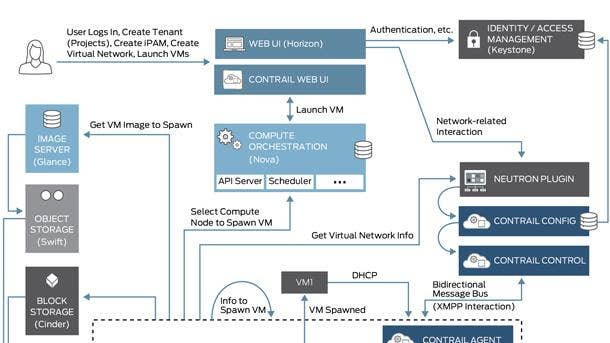
Juniper Contrail Edge Cloud
Juniper Networks has its Contrail family, which is a set of offerings that provide a software-defined approach to multi-cloud and fabric management, automation for infrastructures and service management, as well as analytics in multi-cloud environments.
Specifically, Contrail Edge Cloud is aimed at service providers looking to deploy new services at the space- and power-constrained network edge, according to Santa Clara, Calif.-based Juniper. Contrail Edge Cloud abstracts and virtualizes compute, storage and networking resources efficiently and economically in environments such as central offices, base stations, hubs and switching sites. Contrail Edge Cloud extends the capabilities of Contrail Networking and Contrail Security, augmented by Kubernetes, to provide container networking, security and service chaining for emerging applications, such as IoT, Juniper Networks said.
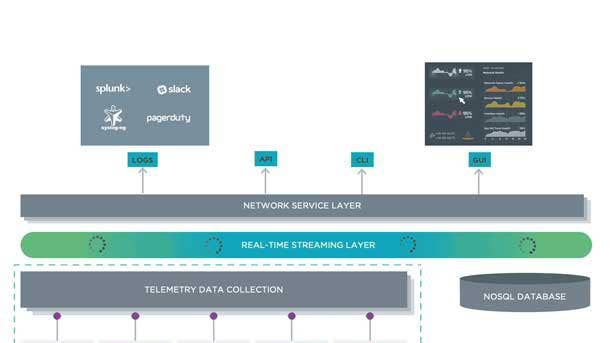
Nvidia Cumulus NetQ
Cumulus Networks, a provider of open networking software, spent the past 10 years helping enterprises build more efficient data centers using open networking software that runs on Linux for bare metal switches. The Mountain View, Calif.-based company turned the head of Nvidia in May, which revealed its plan to acquire Cumulus Networks.
Today, the Nvidia Cumulus NetQ network operations tool uses telemetry for troubleshooting, visibility and automated workflows from a single interface, which the company said will reduce maintenance and network downtimes. Users can easily upgrade, configure and deploy network elements with a full suite of operations capabilities, including visibility, troubleshooting, validation, trace and comparative look-back functionality, according to the company.
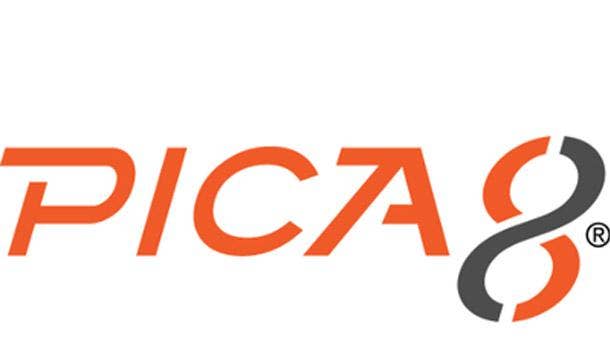
Pica8 Threshold
Palo Alto, Calif.-based Pica8 is a provider of open-standards-based operating systems on white-box network switches. The channel-friendly company was launched in 2009 and immediately took aim at IT market heavyweight Cisco.
Pica8 last year introduced Threshold, an open networking offering for modernizing education, government and Fortune 1000 enterprise networks. The company said Threshold can replace Cisco campus networks, including chassis switches, automation tools and small branch office switches. Threshold offers a centrally managed, intelligent network that uses white-box switches that run on Pica8’s PICOS open networking software suite.
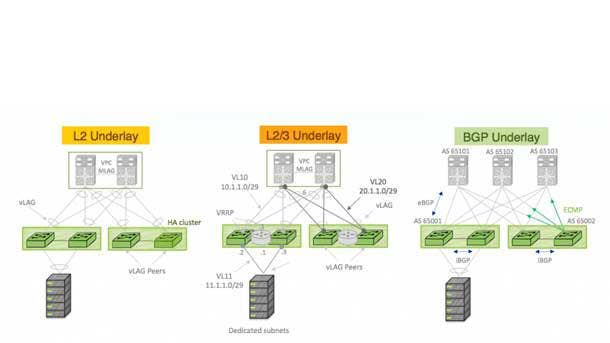
Pluribus Networks’ Adaptive Cloud Fabric
Focusing on network analytics, data center interconnection and SDN offerings, 100 percent channel-focused Pluribus Networks provides open networking-based offerings that use a programmable SDN fabric for data centers and distributed cloud edge architecture.
Pluribus Networks in October updated its Pluribus Adaptive Cloud Fabric, which the company said simplifies operations, reduces human error and lowers costs for data center networking. The controllerless SDN architecture is built on open network switching and incorporates network automation, virtualization, secure segmentation, visibility and analytics in one offering, according to the Santa Clara, Calif.-based company.